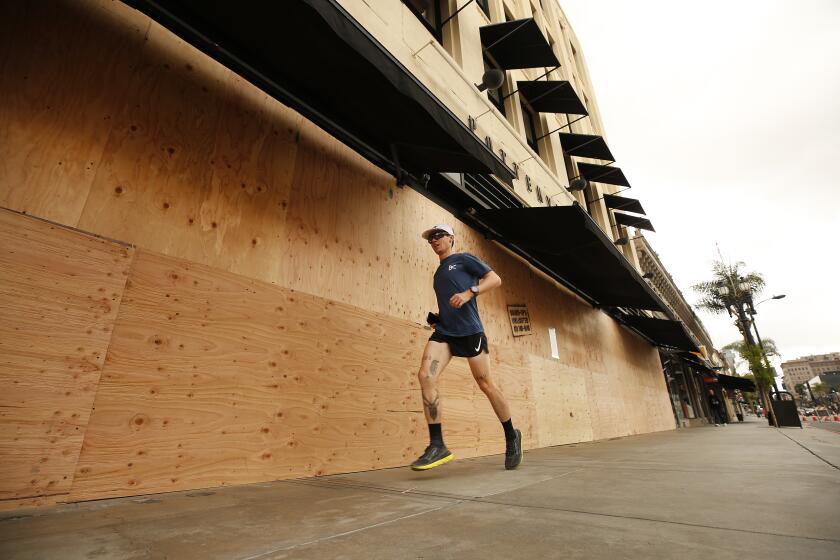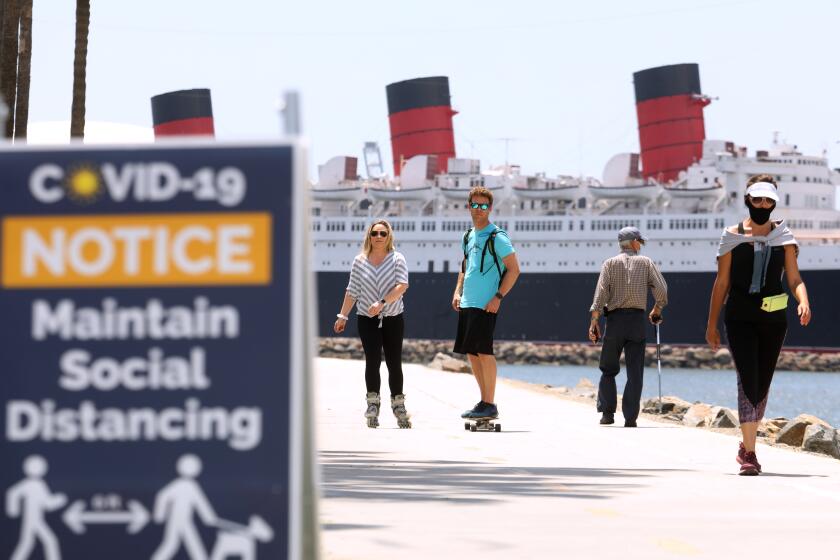No mass prison release for now; federal panel says it can’t rule on coronavirus case
- Share via
A federal court panel has denied an emergency motion to force California prison officials to move thousands of inmates out of harm’s way even as the number of prison workers and inmates testing positive for COVID-19 rises.
“We are living in unprecedented times. The spread of COVID-19 is a global crisis, a crisis that is heightened in the most vulnerable groups among us,” the 13-page ruling begins. But in the end, the deciding judges wrote, the decision on whether to require mass prison releases and other measures is not theirs to make.
The number of prison infections grew in the two days since the judges held a hearing on the emergency motion. By Saturday, 60 people in the prisons, including 47 workers and 13 inmates, were diagnosed with COVID-19. The California Department of Corrections and Rehabilitation said eight inmates are ill at the state prison in Lancaster, four prisoners are infected at the California Institution for Men in Chino, and one at North Kern State Prison.
The request by prisoners’ attorneys for mass releases is “understandable,” and inmates have an Eighth Amendment right to be protected from disease, the ruling states. But the three judges on the special panel ruled that dealing with a pandemic is beyond its authority.
The three-judge court was created in 2007 to address chronic prison overcrowding, and its powers in 2009 were affirmed by the U.S. Supreme Court. The judges Saturday said the question of protecting prisoners from COVID-19 belongs before a single court, such as one overseeing inmate medical care.
“We take no satisfaction in turning away Plaintiffs’ motion without reaching the important question of whether Defendants have implemented constitutionally adequate measures to protect the inmates of California’s prisons from the serious threat posed by this unparalleled pandemic,” the ruling stated.
The number of coronavirus deaths in California jumps to 285 as officials warn of tough weeks ahead amid the virus’ rapid spread.
Inmate lawyers said they plan to refile the motion before a single court. “Yes, definitely,” said Don Specter, executive director of the Prison Law Office in Berkeley.
The decision by the three-judge court also laid out expectations that the state prison system needs to do more.
“It is likely that only through significant effort will California’s prisons be able to minimize the spread of COVID-19,” judges wrote.
Prisoner’s lawyers took that language as a partial victory.
“It’s a clear message to the state,” said Michael Bien, one of the lead attorneys for inmates in the federal civil rights case.
California has shut off visitation and volunteer programs, halted the admission of an expected 3,000 new inmates waiting in county jails, and began screening workers as they enter prisons.
How can the new coronavirus affect people so differently — killing some while leaving others blissfully unaware that they have been infected at all?
The state has already begun to process some 3,500 inmates to be released early in the next two months. One prison inmate at Chino told family members a parole agent came by Saturday, with news that he would be released by April 13.
State lawyers argued that going beyond those releases would hamper programs to help the homeless and burden community hospitals.
California has other options beside mass prison releases, Bien said. “There’s power to transfer prisoners, there are other places where prisoners can be,” Bien said, including empty state facilities and properties that can be rented or commandeered.
The ruling was not entirely unanimous. U.S. District Judge Kimberly Mueller in Sacramento concurred with the final ruling, but disagreed on whether the panel had the authority to reconsider crowding limits during the pandemic.
“The current circumstances appear to expose, in stark terms, the potential need to revisit the current population cap,” Mueller wrote. Even so, she said, an order for prison releases is a “last resort” and inmates need first to press their case before a single judge.
Mueller already is presiding over the impact COVID-19 is having on mental health care in the state prison system, including a contested state decision to halt inmate transfers to state psychiatric hospitals.
Some 46,000 inmates live in open dorms with bunks two feet apart. The prison medical system reports that 45,000 of the state’s 120,000 inmates — 37% —have at least one health risk to COVID-19 infection, including 14,700 inmates with asthma.
California plans to move some 500 inmates out of those dorms to alternative housing that includes beds set up in gymnasiums, a return to a practice California used at the height of crowding.
More to Read
Sign up for Essential California
The most important California stories and recommendations in your inbox every morning.
You may occasionally receive promotional content from the Los Angeles Times.











